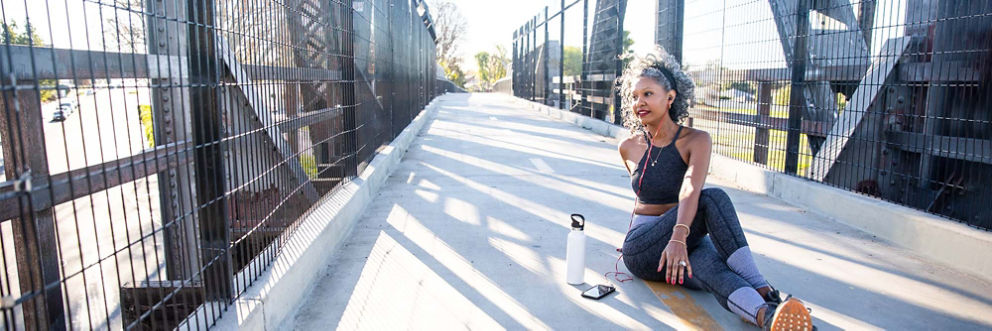Degenerative Disc Disease
Specialized treatment for degenerative disc disease
Feeling a little less flexible or experiencing aches and pains in our neck and back are often a part of life – and can become more common as we age. At TRIA, we believe that back pain shouldn’t keep you from your normal daily routine or doing the things you love.
Back pain can be caused by injury, changes in activity levels or changes in stress and muscle tension. Normal age-related changes in the spinal discs, sometimes called degenerative disc disease, can cause your back to feel painful and stiff while moving, sitting or doing certain activities.
Our team of experts includes physical therapists, sports medicine doctors, medical spine specialists and orthopedic surgeons. We offer the latest in treatment options, including hands-on techniques, exercise, medication management and surgical techniques.
"Thank you for helping get me back to pain-free status!"
Degenerative disc disease symptoms
The most common symptom of degenerative disc disease is pain. Where you feel pain in your back is typically related to which spinal disc is injured.
If you experience any of the following types of back pain, it could be a sign of degenerative disc disease:
- Pain in your lower back, butt or thighs
- Pain that comes and goes
- Pain that feels worse while sitting and lessens while moving
- Pain that feels worse when bending over, leaning or twisting
- Pain that lessens when you shift positions or lie down
Other symptoms include reduced range of movement, numbness or tingling in the back or lower extremities, and stiffness in the back or neck. If you have any of these symptoms, it might be time to discuss your condition with one of our physical therapists or doctors.
What causes degenerative disc disease?
Degenerative disc disease isn’t really an illness. The name refers to how the discs in our spine wear out as we age. Injuries, playing sports and even regular daily activities can hurt the spinal discs and affect their function – and when a disc is injured, it can’t repair itself.
Wearing out our spinal discs is a normal part of aging. Almost everyone will experience some kind of disc degeneration as they age, but not everyone will have back pain. If you do have back pain, our orthopedic doctors can help you get the treatment you need.
Treatments for degenerative disc disease
We’ll create a personalized treatment plan for you based on your symptoms and lifestyle. Common treatments we recommend for degenerative disc disease include:
Physical therapy for degenerative disc disease
Our physical therapists use targeted exercises, education and healing touch to strengthen your back and core muscles to better support your spine. We’ll also work with you to improve your flexibility and range of motion.
During your sessions, we’ll teach you about the cause of your back pain, how to prevent injury and how to get back to your daily routines with confidence. We also provide customized home exercise plans so you can continue to make progress between sessions. It usually takes about six sessions to complete your treatment plan, but many people start feeling relief after their first visit. You can make an appointment with one of our physical therapists directly, you don’t need a referral.
We have many different
Anti-inflammatory medicines
As your spinal discs wear out, they can become inflamed and swollen, causing them to press painfully against the nerves in your back. Depending on your diagnosis, we may prescribe nonsteroidal anti-inflammatory drugs (NSAIDs) to reduce the inflammation contributing to your pain.
If steroids are the best treatment option for you, we may suggest a medication such as prednisone. We may also recommend supplements, like glucosamine, to manage inflammation and promote the growth of healthy tissue.
Degenerative disc disease surgery
If nonsurgical treatments don’t effectively manage your back pain, surgery may be your best option. Artificial disc replacement and spinal fusion are the most common surgeries we recommend to treat degenerative disc disease.
During artificial disc replacement surgery, we’ll remove the injured spinal disc and replace it with a prosthetic. This enables your spine to move more comfortably and reduces pain.
Spinal fusion is a surgery where we connect or “fuse” part of the spine together. This stops the injured disc from moving which relieves pain.
At TRIA, we’ll never push you toward surgery unless it’s the most effective treatment option for you. We’ll talk with you about the type of surgery we recommend, answer your questions and help you understand the procedure.
Specialty programs for degenerative disc disease
At TRIA, we have many specialized programs that help our patients recover from degenerative disc disease. These programs are commonly recommended to complement your treatment plan.
Integrative medicine uses holistic treatments that are scientifically proven to help reduce pain and promote healing. These treatments include acupuncture, our TRIA Well consults and others.
We’ll guide you to the types of integrative medicine treatments that can help manage back pain caused by degenerative disc disease. Integrative medicine can be used to complement your treatment program, or after back surgery to help you recover.
The TRIA Pain Management Program is made up of fellowship-trained physicians, physical therapists and psychologists who offer the most current and effective medical interventions and therapies.
We know that each person experiences pain differently. That’s why we tailor each pain management plan to your needs, lifestyle and unique circumstances. Our goal is to help you manage your pain to improve how your back functions and help you get back to your routine.
